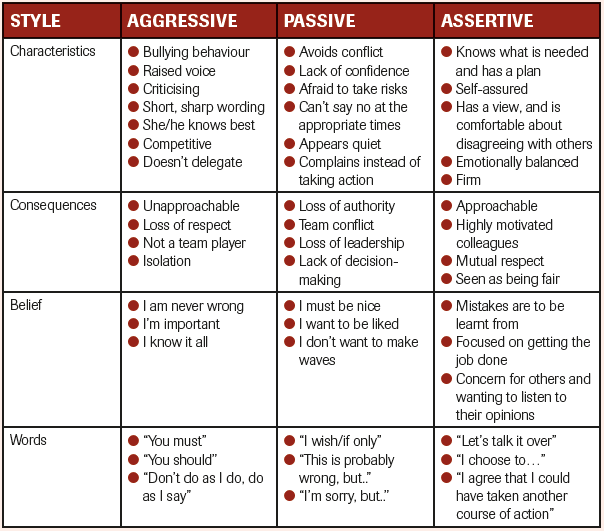Being assertive can be defined as being €confident and direct in claiming one's rights or putting forward one's views€, according to the Collins English Dictionary.
Is this a skill you should develop further?
There may be many situations when you might feel that you could have been more assertive, such as agreeing to take on an additional task that you didn't want to, or not being able to effectively make a request of someone in your team. Being assertive involves communicating thoughts, feelings or needs in a direct, honest manner and being able to stand up for your rights while still respecting the rights and needs of other people
If you act assertively, you feel that you have made your point and won't worry about what might have been. It will save time and energy in the long term, as you/your team will be doing what is needed.
There are different ways of relating to others: being passive (or non-assertive), being aggressive or being assertive. The table overleaf shows some features of aggressive, passive and assertive styles.

To apply assertive behaviour:
- Consider what you want (ensuring it is realistic)
- Prepare what to say
- Consider when and where to say it
- Be specific, clear and positive
- Express feelings and needs
- Be prepared for compromise, if appropriate, or to be firm and consistent if not.
There are different situations where assertive behaviour may be needed. A few examples follow:
1. Asking someone to do something
Many people can be passive when making requests. The aim when being assertive is to ask in a straightforward way, without making it difficult for the other person to say no.
Some tips and ideas include:
- Be clear about what it is you want to happen €“ and check that it is reasonable
- Define the situation, without making a long speech
- Be direct
- Keep it short
- Don't apologise
- Give a reason for the request, if it helps, but ensure it is a genuine reason
- Frame it positively, ie think about what you want, not what you don't want
- Avoid playing on other's friendship or good nature, eg €Be a pal and do this for me€
- Respect the other person's right to say no. If it's a personal request, accept no and avoid becoming persistent with pleading/bullying.
- With a work request, give and get information €“ why can't it be done? If it is still no, use the opportunity to work together to find a solution.
Compare the following two ways of asking Jean to file prescriptions, a task that is normally completed by a colleague.
€Jean, as you know, Annie has been off and I'd really like those prescriptions sorted and filed by the end of today. Can that be done?€
€Jean, I'm really sorry. I haven't been able to get round to much this week, and Annie was going to help me out, but she's not been in. I know you're really good at this, so do you think you could get started with the end-of-the-month filing stuff if it's not too much trouble. Otherwise, they might not get sent off in time and then we'll have the area manager on the phone.€
